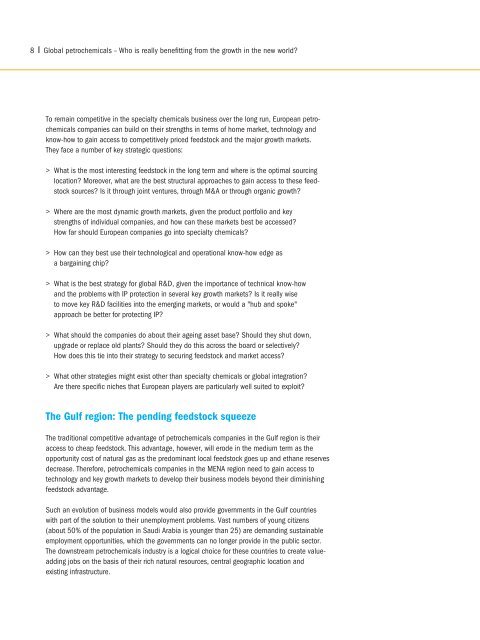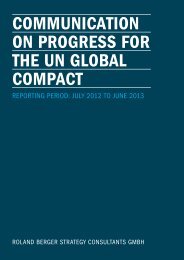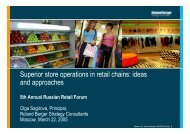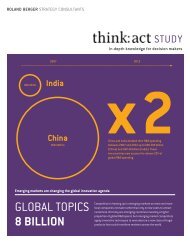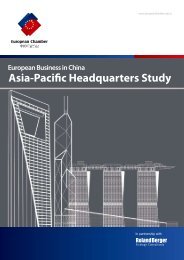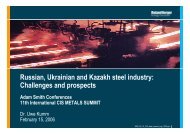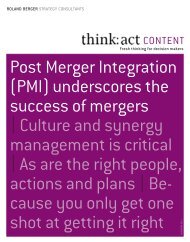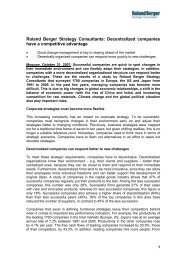Global petrochemicals - Roland Berger Strategy Consultants
Global petrochemicals - Roland Berger Strategy Consultants
Global petrochemicals - Roland Berger Strategy Consultants
- No tags were found...
You also want an ePaper? Increase the reach of your titles
YUMPU automatically turns print PDFs into web optimized ePapers that Google loves.
8<strong>Global</strong> <strong>petrochemicals</strong> – Who is really benefitting from the growth in the new world?To remain competitive in the specialty chemicals business over the long run, European <strong>petrochemicals</strong>companies can build on their strengths in terms of home market, technology andknow-how to gain access to competitively priced feedstock and the major growth markets.They face a number of key strategic questions:> What is the most interesting feedstock in the long term and where is the optimal sourcinglocation? Moreover, what are the best structural approaches to gain access to these feedstocksources? Is it through joint ventures, through M&A or through organic growth?> Where are the most dynamic growth markets, given the product portfolio and keystrengths of individual companies, and how can these markets best be accessed?How far should European companies go into specialty chemicals?> How can they best use their technological and operational know-how edge asa bargaining chip?> What is the best strategy for global R&D, given the importance of technical know-howand the problems with IP protection in several key growth markets? Is it really wiseto move key R&D facilities into the emerging markets, or would a "hub and spoke"approach be better for protecting IP?> What should the companies do about their ageing asset base? Should they shut down,upgrade or replace old plants? Should they do this across the board or selectively?How does this tie into their strategy to securing feedstock and market access?> What other strategies might exist other than specialty chemicals or global integration?Are there specific niches that European players are particularly well suited to exploit?The Gulf region: The pending feedstock squeezeThe traditional competitive advantage of <strong>petrochemicals</strong> companies in the Gulf region is theiraccess to cheap feedstock. This advantage, however, will erode in the medium term as theopportunity cost of natural gas as the predominant local feedstock goes up and ethane reservesdecrease. Therefore, <strong>petrochemicals</strong> companies in the MENA region need to gain access totechnology and key growth markets to develop their business models beyond their diminishingfeedstock advantage.Such an evolution of business models would also provide governments in the Gulf countrieswith part of the solution to their unemployment problems. Vast numbers of young citizens(about 50% of the population in Saudi Arabia is younger than 25) are demanding sustainableemployment opportunities, which the governments can no longer provide in the public sector.The downstream <strong>petrochemicals</strong> industry is a logical choice for these countries to create valueaddingjobs on the basis of their rich natural resources, central geographic location andexisting infrastructure.


